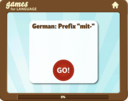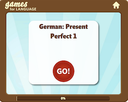
German Language Game: der + adjective + Noun
German Language Game: Practice: "der + adjective + Noun".
You'll use (and guess) 8 common masculine nouns and 8 adjectives in various combinations.
It will help you become familiar with a common German language pattern.
The key is to always say the German OUT LOUD!
Tips for guessing noun gender in German: Masculine
Male people and male animals; days, months, seasons; north, south, west, east.
Examples:
- der Mann - the man
- der Kater - the male cat
- der Montag - the Monday
- der Januar - the January
- der Frühling - the spring
- der Norden- the north
Nouns ending in: -ant, -ig, -ling, -us
Examples:
- der Praktikant - the intern
- der König - the king
- der Neuling - the novice
- der Sozialismus - the socialism
But that leaves a lot of other nouns that you just have to get familiar with.
Der + adj + masculine Nouns in German Game
- der junge Mann - the young man
- der nächste Tag - the next day
- der nette Besuch - the nice visit
- der kleine Schlüssel - the small key
- der gute Roman - the good novel
- der große Platz - the big square
- der schöne Garten - the beautiful garden
- der alte Freund - the old friend
If you like our games, please SHARE us with your friends.
More Than a German Language Game
Don't forget: You can practice German online for FREE with our 36-Scene German 1 Story: "Michael in Deutschland" and our 72-Scene German 2 Mystery Story Sequel: "Blüten in Berlin?".
(If you already know that "Blüten" means blossom in German - you'll learn that Blüten has still another meaning...).
Just login HERE.
And, if you have any language questions - don't hesitate to contact us!

German Language Game: Hello Goodbye
Quick German Language Game Hello Goodbye.
Level: Beginner (A1)
Playing Time: 3 minutes
With this game you can learn and review 8 greetings and common phrases. Even if you learn no other German, these polite phrases are essential for any visit to a German-speaking country.
When you use these German words and expressions, you show you're willing to get out of your own language shell. And, often they are great conversation openers with locals.
Note the meanings of "bitte" and "wie bitte?" The word "bitte" also has a number of other meanings not listed here. Context is important.
Words and Phrases in German Language Game
- Hallo - Hi
- Guten Morgen - Good morning
- Guten Tag - Hello [" good day", standard formal greeting]
- Guten Abend - Good evening
- Danke - Thanks
- Bitte - Please
- Wie bitte? - Excuse me? ["what?", i.e. you didn't understand]
- Auf Wiedersehen - Goodbye
The key is to say the German OUT LOUD after the speaker.
If you like our games, please SHARE us with your friends.
More Than a German Language Game
And don't forget: You can practice German online for FREE with our 36-Scene German 1 Story: "Michael in Deutschland" and our 72-Scene German 2 Mystery Story Sequel: "Blüten in Berlin?".
(And - if you already know that "Blüten" means blossom in German - you'll learn that Blüten has still another meaning...). Just login HERE.
If you have any language questions - don't hesitate to contact us!

German Language Game: Fahren - Present Tense
Quick German Language Game: "fahren" (to drive, go by vehicle, ride).
Level: Elementary (A2)
Playing Time: 4 minutes
The verb "fahren" and the noun "die Fahrt" are words used frequently in everyday German.
(Image: Eduard Flores on unsplash.com)
Test yourself on the present tense of "fahren".
Learn to form simple sentences with "weiterfahren" and "zurückfahren".
Fahren - Present Tense
Note changes in the stem vowel from "a" to "ä" in 2nd and 3rd person singular.
- ich fahre - I drive
- du fährst - you drive (familiar)
- er, sie, es fährt - he/she/it drives
- wir fahren - we drive
- ihr fahrt - you-all drive
- sie fahren - they drive
- Sie fahren - you drive (formal)
Vocabulary
- weiterfahren - to drive on
- Bitte fahren Sie weiter. - Please drive on.
- zurückfahren - to drive back
- ich fahre zurück - I'm driving back
- Morgen fahre ich zurück. - Tomorrow I'm driving back.
- die Fahrt - the drive, trip, ride
- Einfache Fahrt bitte. - One-way (ticket) please.
- Gute Fahrt! - Have a good trip.
If you like our games, please SHARE us with your friends.
More Than a German Language Game
And don't forget: You can practice German online for FREE with our 36-Scene German 1 Story: "Michael in Deutschland" and our 72-Scene German 2 Mystery Story Sequel: "Blüten in Berlin?"
(If you already know that "Blüten" means blossom in German - you'll learn that Blüten has still another meaning...).
Just login HERE.
If you have any language questions - don't hesitate to contact us!

German Language Game: Prefix "mit-"
German Quick Language Game: Prefix "mit-."
Play this quick game to learn how separable prefixes work in German.
The prefix "mit-" is separable.
So, in simple sentences, "mit-" goes at the end.
The prefix "mit-" combines with verbs such as: "kommen", "bringen", "nehmen".
The verbs "mitkommen", "mitbringen", "mitnehmen" are separable-prefix verbs, as in the sentences:
- Ich nehme es gern mit. (I'm happy to take it along.)
- Darf ich mitkommen? (May I come along?)
- Ich bringe auch ein paar Freunde mit. (I'm also bringing a couple of friends along.)
Learn to use these verbs in context with our fun, interactive "Word Invader" game.
The key is say the German OUT LOUD after the speaker.
If you like our games, please SHARE us with your friends.
More Than a German Language Game
Don't forget: You can practice German online for FREE with our 36-Scene German 1 Story: "Michael in Deutschland" and our 72-Scene German 2 Mystery Story Sequel: "Blüten in Berlin?".
(If you already know that "Blüten" means blossom in German - you'll learn that Blüten has still another meaning...).
Just login HERE.
And, if you have any language questions - don't hesitate to contact us!

German Language Game: Present Perfect 1
German Language Game: Present Perfect Tense.
Learn and practice the basics of the German Present Perfect Tense, which is also called the "Conversational Past."
This tense is commonly used in casual conversations when talking about the past.
In English, on the other hand, you would often use the simple past for the same situations.
The German Present Perfect Tense uses the auxiliary verbs "haben" and "sein".
In this short interactive game, you'll learn to conjugate and use "haben" with 4 common verbs.
Here's "haben":
- ich habe - I have
- du hast - you have (fam.)
- er, sie, es hat - he, she, it has
- wir haben - we have
- ihr habt - you-all have
- sie/Sie haben - they/you (form.) have
You'll combine "haben" with the 4 following verbs:
- sagen - to say, tell
- kaufen - to buy
- lesen - to read
- lernen - to learn
A sample conjugation:
- ich habe gesagt - I said
- du hast gesagt - you said
- er, sie, es hat gesagt - he, she, it said
- wir haben gesagt - we said
- ihr habt gesagt - you-all said
- sie/Sie haben gesagt - they/you (form.) said
German, does have a Simple Past Tense.
The Simple Past is generally used to narrate past events, and thus is often called the "Narrative Past." In addition, the Simple Past is used in written German.
